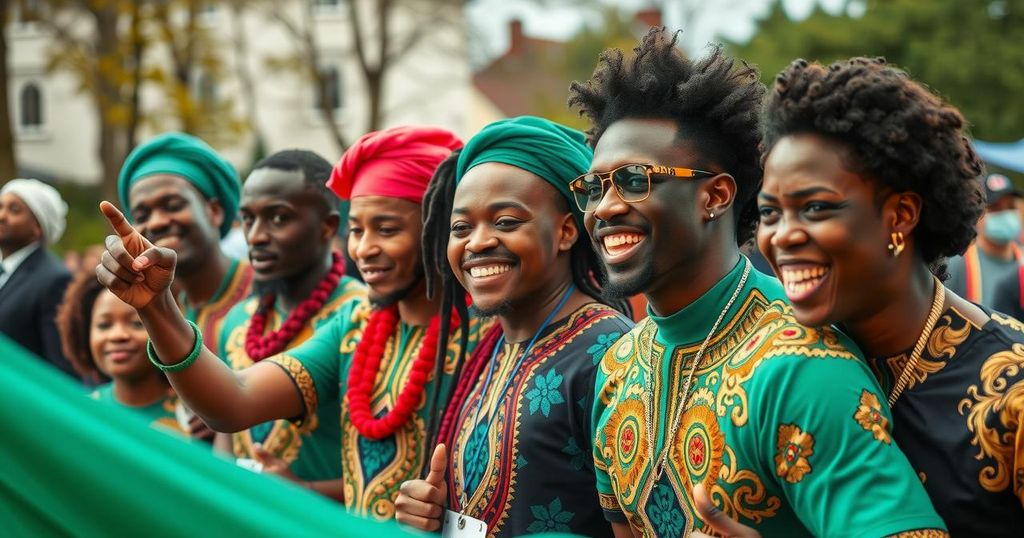Nigerian Igbos Establish Running Club in the UK to Foster Cultural Connectivity

The Ozo running club in London’s Hyde Park unites Nigerian Igbos seeking to strengthen cultural bonds through running. Founded by Igbo community members, it has quickly grown to over 300 members, promoting unity and inclusivity. Weekly sessions go beyond fitness, offering opportunities for friendship and cultural expression while addressing the historical marginalization of the Igbo people. The club emphasizes importance on community-building and cultural pride amidst the diaspora.
On a brisk Saturday morning at London’s Hyde Park, the Ozo running club gathers, uniting predominantly Nigerian members of the Igbo community. Established to foster connections among young Igbo individuals, the club, co-founded by Chibueze Odoemene, Emeka Atumonyogo, and Chigo Ogbonna, has swiftly amassed over 300 members in under three months. Their gatherings extend beyond exercise, functioning as a venue for cultural celebration and community bonding, emphasized by traditional Igbo chants like “Igbo kwenu!” to instill unity and pride among participants.
As social running clubs proliferate globally, fueled by a reported 59% rise in participation according to Strava, Ozo stands out for its inclusive environment, where individuals from diverse backgrounds are welcomed to learn about Igbo culture. While many members, such as Francesca Ngozi Ezennolim, express a desire for community among fellow Igbos, the club also serves as a platform for friendships and potential romantic relationships. Co-founder Atumonyogo pointed to the club’s openness, stating, “You don’t have to be Igbo to come to the run club.”
Despite the prevailing joy within the running community, many Igbos grapple with the historical marginalization stemming from Nigeria’s civil conflict, the Biafran war. This shared history has fostered a sense of urgency among the club members to promote and preserve Igbo identity overseas. Uzoma Ehziem articulated this sentiment, asserting that “Yoruba culture dominates what many in the UK think of as ‘Nigerian.'”
Ozo does not solely focus on running; it organizes monthly social events, enriching the community’s experience through varied activities. After each run, members reinforce bonds through casual interactions, emphasizing the importance of their shared identity and cultural heritage. The weekly meetings thus evolve into a foundation for enduring relationships concentrated on cultural pride and unity among the Igbo diaspora.
Nigerian Igbo people comprise one of the country’s largest ethnic groups, known for their rich culture and traditions. In the diaspora, especially in the UK, the Igbo population has seen a notable increase, rising from approximately 8,000 to 11,000 over the past decade. Despite their number, there are concerns regarding the visibility and recognition of Igbo culture, as many outside Nigeria primarily associate the Nigerian identity with the Yoruba ethnic group. These dynamics motivated the creation of the Ozo running club, aimed at fortifying cultural ties and fostering community among Igbos while enhancing social cohesion through shared activities such as jogging. The club’s formation comes against the backdrop of the historical complexities surrounding the Igbo people’s experiences, particularly linked to the Biafran war of 1967-70, which has contributed to a lingering perception of marginalization. As younger generations grapple with their cultural identity, organizations such as the Ozo running club provide essential spaces for preservation and expression of their heritage. Furthermore, the growth of social running clubs has become a global phenomenon, offering individuals platforms to connect, build friendships, and maintain physical activity. The Ozo running club exemplifies this trend, uniquely centered around Igbo cultural identity and community building.
The Ozo running club is emblematic of the Nigerian Igbo community’s efforts to cultivate cultural presence and unity within the diaspora in the UK. Established to counteract the perceived marginalization of Igbo identity, the club not only serves as a platform for fitness but also fosters deep social connections through shared cultural experiences. By welcoming participants from diverse backgrounds, it promotes a narrative of inclusivity and collective identity. The sense of community created through traditional Igbo gatherings and monthly events underscores the importance of preserving and celebrating cultural heritage among young Igbos. Ultimately, the club represents a proactive approach to enhancing cultural visibility and building lasting relationships while countering historical narratives of division.
Original Source: www.bbc.com







